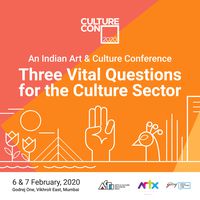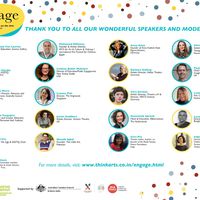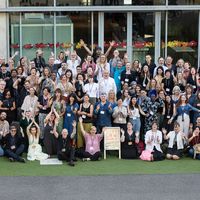CultureCon 2020 | Interview
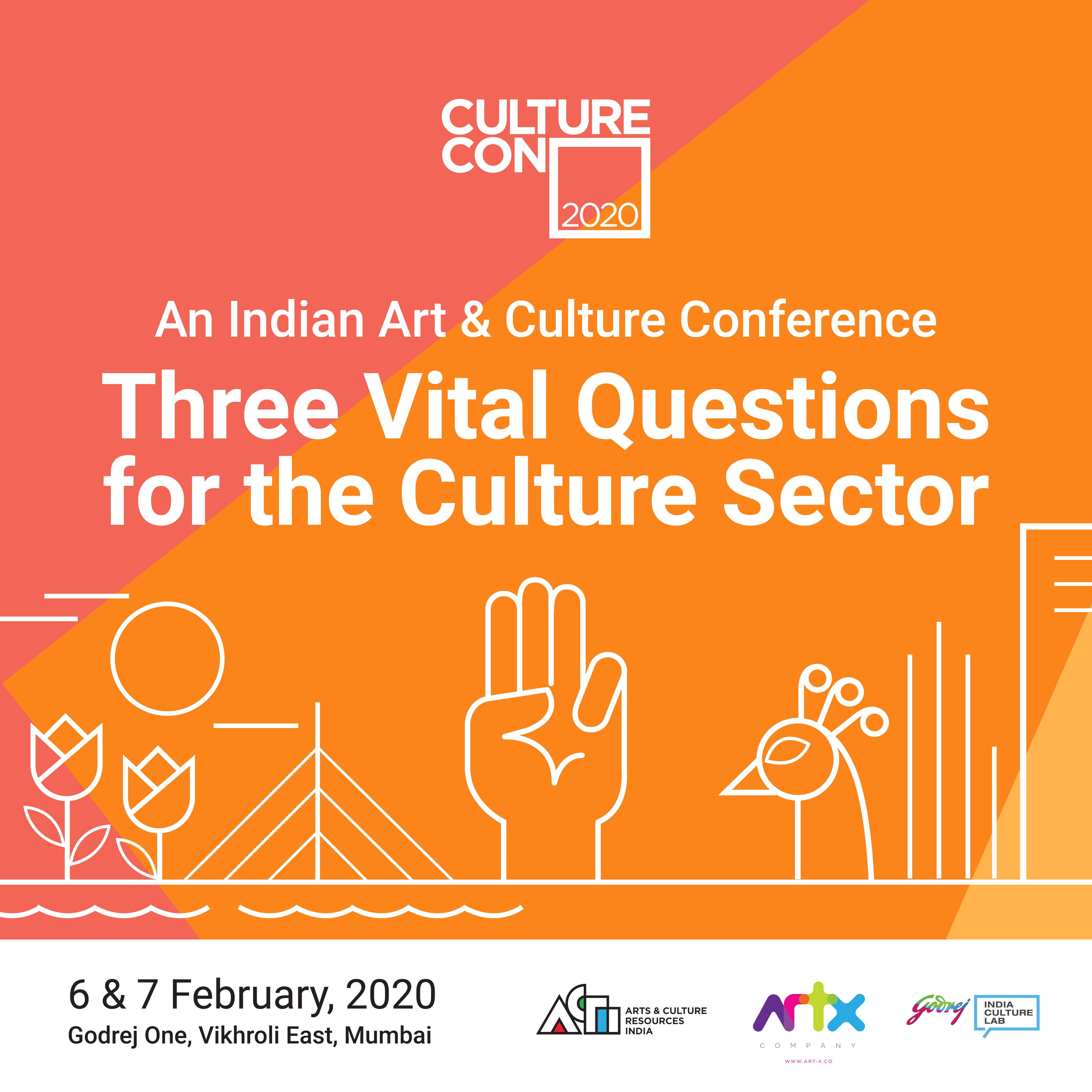
As part of the media partnership between culture360.ASEF.org and The Art X Company, we interviewed Parmesh Shahani, Head, Godrej India Culture Lab and Rashmi Dhanwani, founder, ArtX Company to tell us more about CultureCon 2020, which took place in February in India.
How would you describe India’s culture sector? With that in mind, what did you set out to achieve when you were in the initial stages of planning CultureCon 2020?
Parmesh: The idea behind CultureCon was to allow for a cross pollination of cultural professionals hailing from varying disciplines, cultural backgrounds, and organisation models. This could, in turn, lead toward unexpected collaborations, paving the way toward a brighter future of the cultural sector. Cultural professionals from all walks of life sharing the same room – the possibilities were endless!
While co-curating the conference, we were broadly interested in answering vital questions about the culture sector in India and hence the name CultureCon – a conference which creates a space for conversations on who makes ‘culture’ and for whom. Our primary focus in the conference has been to revise, question and come up with multiple meanings of culture while answering the ‘Organisation, People and Money Questions’.
Rashmi: Calling India’ culture sector merely diverse and vibrant would be an understatement. It’s much more complex… a multiverse, replete with multiple realities of income and power; class, class and gender intersectionalities; and complex microstructures of operations that emerge out of the lack of a formal structure. These challenges of boundaries, structure and thought leadership around ecosystem growth, are what cultural workers and entrepreneurs working in the sector, face on an ongoing basis. Moreover, there are few ecosystem building organisations or consistent platforms to air these challenges and find a way to tackle them. This realisation became the trigger point for our curation of CultureCon. We took a step back and looked at larger academic/ policy-based conversations around these challenges, and surprisingly, we found that that despite the vibrancy and socio-economic importance of cultural work and production, theirs is little thought leadership built around these issues.
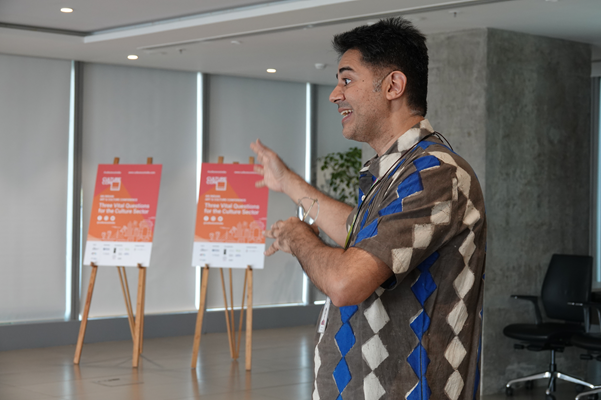
Photo from Day 1 of CultureCon 2020
In India, conversations around culture sector growth, issues and cultural policy find little resonance across academia or practice. Advocacy for the sector is largely relegated to funding, operational challenges, or contentious issues (such as the #MeToo movement or freedom of expression for artists) as and when they find space in current affairs. This has led to several barriers to growth, both ideological and economic, for the sector.
With the above in mind, CultureCon was aimed at examining the unique structure of India’s culture sector, both academically and practically, from within contemporary realities while encapsulating both local and global perspectives.
In order to do this, we needed two touch points in the conference: one, academic, covering the first day of the conference, to lay the ground. The second, had to be practical, covering networking and collaboration visits among promising organisations and models across Mumbai. We started building CultureCon with this kernel of an outcome in our minds.
You have just successfully concluded the inaugural edition of the conference; how did the conference go? What was the audiences’ reception towards the conference?
When we started working on the conference, we had clear success evaluation metrics outlined dealing with, a) the type of audience; b) engagement with local, regional and national cultural organisations; and, c) specific feedback from the delegation. I’ll take you through some of them below:
a) Audience
The audience should be diverse representing equitable genders, age groups, types of sectors and geographic location.
- 65% of our attendees were women
- Majority of the delegates came from the 25-34 years age group (42.3%)
- A majority of the delegates were mid-career professionals (46%)
- Delegates represented and worked in the following domains: Architecture, Art Foundation/ Funding, Arts Academia, Arts Education, Arts Media, Arts Services, Cultural Presenters; and sub-sectors: Dance, Design, Film, Literature & Publishing, Museums & Heritage, Music, Theatre and Visual Arts
b) Engagement with local, regional and international cultural organisations
We worked with a huge number of local and regional organisations including 11 city-based organisations, 5 regional organisations (including foreign cultural organisations) and 1 international organisation. Engagement ranged from financial support, media support, to hosting the delegation for collaboration visits.
c) Audience reception
In relation to the conference organisation and planning
- 100% agreed that the information shared about the conference and the schedule ahead of the conference was ‘very clear’
In relation to the quality of the sessions, speakers and content
- 96.2% felt that there were many opportunities to network with speakers and attendees
- 92.3% found the sessions and discussions relevant to the culture sector
Top responses to aspects of the conference that were most valuable to them
- The opportunity to meet and network with creative professionals, and the quality of the delegates
- Insights on fundraising
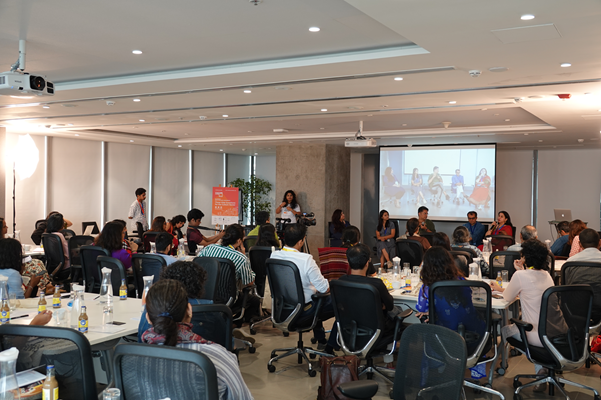
Photo from Day 1 of CultureCon 2020
The conference focused on the organisation, people and money aspect of the cultural sector in India. Have you observed any interesting trends among the issues that were discussed?
Rashmi and Parmesh: The sessions were aimed at investigating successful present models of organisational structures, human resource development and funding, while looking towards the future. Investigating this friction gave us a sense of some very insightful trends.
In the organisation question, the speakers offered a crucial insight – the culture sector in India could be organised best with community-oriented models. The top-down approach to management of arts and culture seemed impossible within the context of the collective decision-making process in Indian communities. A subjective, down-up approach, with executive autonomy left to the community itself, would work for the future of culture management in the country. Further, local youth could be empowered to archive local history and culture. This led us to conclude that the future of cultural organisations in India is multidisciplinary, collaborative and bottom-up.
During the people question, the speakers of the session ended with the call for sharing of knowledge, a module of conference learning to collate and collect resources. In addition to the progress made by the sector due to its human resources management, the session also addressed the need for individual growth of cultural professionals, which would in turn help the overall development of the organisation.
In the money question, the format of the session was that of an open table, which allowed anyone from the audience to come up to the main table and join the panel in a discussion. Interestingly, while the panellists brought-up ongoing models of independent funding, trust-based funding and for-profit business development, the delegates were more interested in asking questions about their own sustainability. They weren’t too bothered about seeking large-scale institutional funding or build big structures. They were interested in building their own outfits and projects by their own merit and plans, and had questions about survival, business structures and rationalisations around value for money and return on investment. Trends around creative entrepreneurship, sustainability and a genuine need to understand and building future funding models were very evident.
Moving forward, how do you intend to further build on the ideas and discussions that have emerged from the conference?
Rashmi and Parmesh: First, a white paper documenting the conference will be generated by March 15 and circulated among all attendees. Second, we are working on developing a position paper that attempts to define the "Indian Culture Sector". The conference platform and the network it engages will be used to build consensus around the definition.
The end goal of the conference is to initiate a crucial dialogue around bringing the cultural community together in an effort to organise the sector and build the blocks needed to formalise the work of this sector in policy mandates.
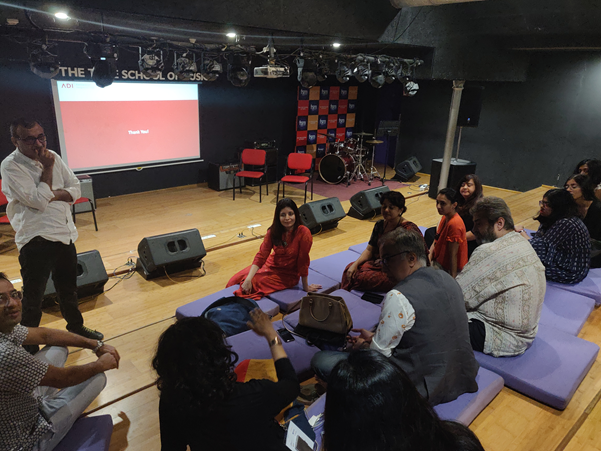
More photos from CultureCon 2020
How do you see the evolution of CultureCon as an arts and culture conference in India?
Rashmi: Considering there’s isn’t a single consistent effort/ event focusing on structural movements and trends around India’s cultural sector, CultureCon is uniquely positioned to occupy this gap and fill the need to drive the growth of the ecosystem. As an annual conference, CultureCon will continue to be the holding ground for discussion of ideas, develop thought leadership and drive consensus-led direction for the culture sector. What is crucial though, is for ongoing work around building the community and network, authoring position papers and research reports and enable skilling and arts management nodes in the country. Arts Culture Resources India, a network and platform for cultural professionals in India and South Asia, will work year round to drive these conversations and build the network through its Membership Network.
Do you have any plans to open up the conference to culture sectors of other countries in Asia and Europe?
Rashmi: We haven’t put our mind to it yet as the immediate priority to address and engage with the needs of the home sector. However, international delegates are welcome to apply to attend the conference next year. If and when we do open up, we’ll certainly prioritise South Asia first, given the similarities of our models of work and operation within our sectors followed by the rest of Asia and then Europe.
Parmesh Shahani - Head, Godrej India Culture Lab
Parmesh Shahani is Vice President at Godrej Industries Ltd and the founder of the award winning Godrej India Culture Lab, which sparks conversations about the changing face of contemporary India. Parmesh is a passionate advocate for LGBTQ inclusion in corporate India and has guided many of the country’s leading companies on their inclusion journeys. His first book Gay Bombay:nGlobalization, Love and (Be)Longing in Contemporary India (Sage Publications) was released in 2008, and the upcoming Queeristan: LGBTQ Inclusion in Corporate India (Westland Books) will be released in mid 2020. Parmesh holds an MS in Comparative Media Studies from MIT. He is a TED Senior Fellow and in the past has been a Yale World Fellow and a World Economic Forum Young Global Leader.
Rashmi Dhanwani - Founder, The Art X Company
Rashmi is the Founder of the Art X Company, a strategic consultancy for the cultural sector focused on strategy, audience development and sector research. Prior to founding Art X, Rashmi has worked with NCPA Mumbai, Breakthrough in Delhi, the newspaper Daily News and Analysis (DNA); Kalaghoda Arts Festival, and The Goa Project.
She holds a Masters in Cultural and Creative Industries from King’s College London. She has also been a recipient of the ARThink South Asia Fellowship (2011-12), a participant fellow at ‘The Academy—a program of Carnegie Hall, The Juilliard School and the Weill Music Institute’, a scholarship grantee of the JN Tata Trust and Charles Wallace India Trust, and a 2017 Global Fellow of the International Society for Performing Arts (ISPA), New York.
Rashmi also founded Arts Culture Resources India, a network and platform for cultural professionals in India and South Asia.
Visit https://cultureconindia.com/ for more information and stay tuned for more updates via social media: Facebook/Twitter/Instagram: @cultureconindia
Similar content
from - to
06 Feb 2020 - 08 Feb 2020
from - to
29 Jun 2021 - 29 Jun 2021
from - to
01 Nov 2018 - 03 Nov 2018
deadline
30 Jun 2020

